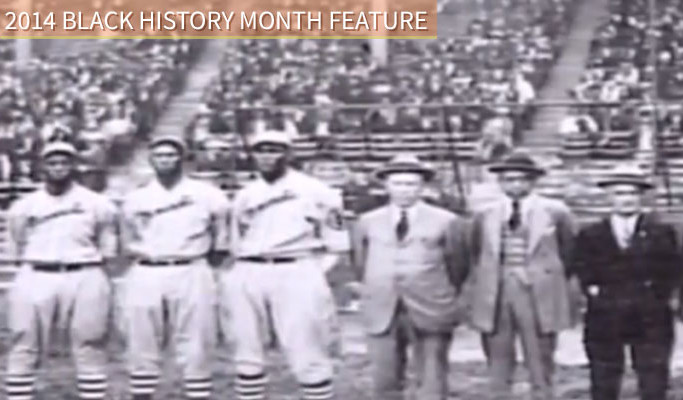Business
Negro League Baseball and The African-American Economy

By Robert J. Newman and Joel Nathan Rosen
In 1883, when Chicago White Stockings’ star, Cap Anson, refused to compete against a Toledo, Ohio team that featured an African-American player, Moses Fleetwood Walker, mainstream baseball drew an informal color line that remained in place until Jackie Robinson’s Major League debut on April 15, 1947.
Baseball’s color line led directly to the formation of organized leagues and independent teams generally referred to as the Negro Leagues. Made up of African-Americans and dark-skinned Latinos, organized black baseball represented a vibrant business enterprise. Black baseball was a central cog in a machine, a series of businesses that made up a segregated economy that developed in response to both custom and law. Along with black-owned insurance companies, the black press, and the “ethnic” beauty industry, Negro League baseball fueled an economic engine that powered a system of smaller, though equally essential businesses in urban African America.
At the same time segregation severely restricted economic prospects for most African Americans, it provided the opportunity for businesses to offer goods, services, and entertainment otherwise unavailable to their patrons, thereby creating a localized economy. Although this economy was limited, the money flowed back and forth within African American communities in cities such as Pittsburgh, Kansas City, Chicago, New York, and Indianapolis, communities built by the Great Migration, a movement which saw as many as six million African Americans, most of them rural farmers, move North and West during the first six decades of the twentieth century.
Black baseball and enterprise
As a business, black baseball, whether organized or independent, both depended upon and supported other enterprises. Those who labored in baseball, as well as in other branches of the entertainment industry, for example, required room, board, and entertainment. Black designated hotels, restaurants, nightclubs, ballrooms, barrooms, and barbershops in which performers, players, and their audiences would be welcome, filled this need. Often, black businessmen and women had fingers in many pots. Indianapolis A.B.C.’s owner C.I. Taylor, for example, operated a billiards parlor. Pittsburgh’s Gus Greenlee was a major player in both the baseball and music industry. And Robert A. Cole, owner of Chicago’s American Giants, founded Metropolitan Mutual Assurance Company, one of the country’s largest black-owned insurance firms, which in turn owned and operated the Parkway Ballroom, a major entertainment venue. Nevertheless, most businesses were small and most entrepreneurial efforts were modest.
But there was another side to this economy. Black baseball and many other ‘race’ businesses were often capitalized by proceeds from the policy rackets. With payoffs as high as 600-1 on bets as low as a penny, it is easy to see the appeal of laying bets on policy and its close analogue, the numbers, especially for the urban working class, African Americans among them. As such, policy and the numbers were big business for their operators, who were generally members of the communities in which worked. Greenlee and other black baseball entrepreneurs including Alex Pompez, owner of the New York Cubans, Abe and Effa Manley, owners of the Newark Eagles, as well as Greenlee’s competition in Pittsburgh, both in baseball and in the rackets, Homestead Grays’ co-owner Rufus “Sonnyman” Jackson, operated numbers or policy games. Though the rackets were illegal, they also had a positive impact. Numbers and policy functioned as neighborhood savings and loans, credit unions, and investment banks. Greenlee, Pompez, the Manleys, and their ilk were willing to invest in the black economy at a time when mainstream banks were simply unwilling to extend credit to African Americans. Not only did the rackets fund large enterprises like the Negro Leagues, they also worked to support small local businesses where players lay their bets, such as barber shops, beauty parlors, drug stores, cigar shops, and a wide range of others. Certainly, not every business in the segregated economy was solely capitalized with proceeds from the rackets, but the rackets did provide an essential source of funding.
Money and Desegregation
But as times changed, so too did the segregated economy. As Negro League fans became Major League fans once the color-line was breached, black baseball and many of the other businesses that made up the black economy essentially became obsolete. Against the backdrop of African-American soldiers returning from the war with increased expectations for civil liberties and improving economic opportunities, the desegregated Major Leagues represented the possibility of progress. Many previously segregated businesses also began to realize that the most important color was green. As laws and customs changed, black patrons were no longer compelled to patronize segregated hotels and restaurants, and they frequently chose to take their business elsewhere. Small local businesses like barbershops and funeral homes continued to serve their communities, but larger establishments failed under pressure of competition. As such, the Negro Leagues and similar race businesses, all with a vested interest in segregation, simply had no economic future.
Roberta J. Newman and Joel Nathan Rosen are the authors of Black Baseball, Black Business: Race Enterprise and the Fate of the Segregated Dollar, forthcoming in March from the University Press of Mississippi.

-

 Featured10 months ago
Featured10 months agoCalifornia Is the First State to Create A Public Alert for Missing Black Youth
-

 Featured10 months ago
Featured10 months agoAfrican American Leaders Stay the Course Amid Calls for President Biden To Bow Out of Race
-

 Featured10 months ago
Featured10 months agoThe Debate Fallout Lands on Both Candidates
-

 Featured9 months ago
Featured9 months agoPresident Joe Biden Decides to Withdraw from the Presidential Race
-

 Featured9 months ago
Featured9 months agoIn One of His Final Speeches as President, Biden Says It’s Time for ‘Fresh Voices’
-

 Featured10 months ago
Featured10 months agoPresident Joe Biden Describes Shooting of Donald Trump As ‘Sick’

